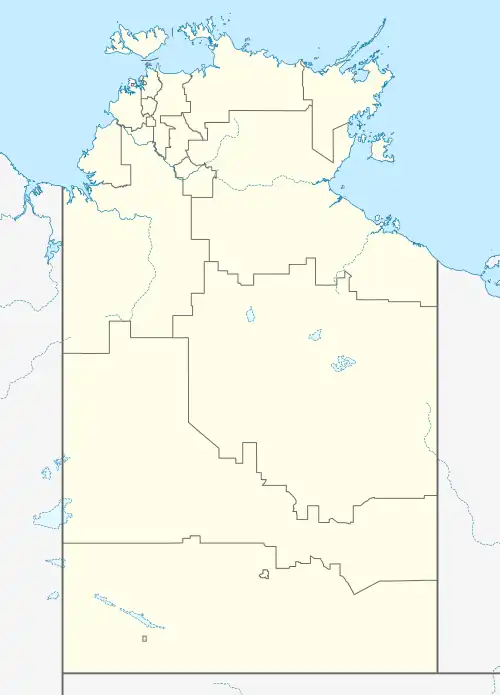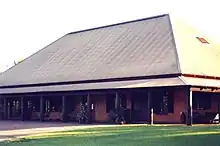Tipperary Station
Tipperary Station is a pastoral lease that operates as a cattle station. It is located about 36 kilometres (22 mi) east of Daly River and 55 kilometres (34 mi) south of Adelaide River, Northern Territory, Australia. Composed primarily of open grazing land the property occupies an area of 209,800 hectares (518,427 acres).[1] The two adjoining sister properties are Elizabeth Downs and Litchfield Stations, all three currently operate as a single entity often referred to as the Tipperary Group.

Description
Tipperary is divided into 72 paddocks with an average size of 30 square kilometres (7,413 acres) and along with neighbouring Litchfield has six permanent steel yards, one set of portable yards, 20 aluminium tanks and 15 bores. The area has a wide variety of natural watering points in the form of springs, creeks and swamps although some can dry up prior to the wet season. The property shares a boundary with Litchfield National Park and Litchfield Station to the north, Ban Ban Springs and Douglas Stations to the east, unclaimed Crown Land to the south and the Malak Malak Aboriginal Land Trust to the west.[2]
History

Established in 1914, the station was taken by William James Byrne who had previously owned a business in Brocks Creek,[3] and eventually acquired Burnside Station. By 1914 he sold Burnside and established Tipperary just beyond the Burnside boundary.[4]
Byrne settled on the property with his wife Elizabeth and they had seven sons, only four of whom lived to adulthood.
Many cattle were killed in late 1925 along the river boundary to the station. Byrne posted a £50 reward for information leading to the conviction of the scoundrel responsible.[5]
When William Byrne died in 1941, the station was left under the management of his widow and three remaining sons, who were also managing neighbouring Burnside Station.[6]
Part of Tipperary was surrendered to the Crown in 1986 along with portions of Stapleton and Camp Creek pastoral leases to form Litchfield National Park.[7]
The station was once owned by entrepreneur Warren Anderson who bought the property in the mid-1980s.[8] Anderson built a zoo stocked with 1800–2200 animals including a pygmy hippopotamus and a rhinoceros. Other facilities included an indoor equestrian centre, an 8,000 feet (2,438 m) bitumen runway suitable for a Boeing 727 to land, and resort accommodation. He had intended to stock the group with 200,000 head of cattle but struck financial problems and sold the property in 2003.[9]
The group was then acquired by Melbourne-based barrister Allan Myers QC for $50 million along with the 80,000 cattle. Myers also acquired Elizabeth Downs, Fish River and Litchfield Stations.[10]
The Australian Agricultural Company offered A$105 million to acquire Tipperary and Litchfield stations along with the 60,000 head of cattle in 2009,[11] but its shareholders voted against the acquisition at an extraordinary general meeting held three months later.[12]
In 2011, the Australian Agricultural Company (AAco) purchased the Tipperary group's cattle herd of 53,000 head for A$26 million, and also entered a one-year agreement to use the station group for agistment purposes with options to extend.[13]
As of 2012, David Warriner, the head of the Northern Territory Cattlemen's Association, was managing the group which was stocked with 70,000 cattle raised for live export to Indonesia.[9] In September 2014 AAco elected NOT to exercise their option to continue with the agistment agreement and decided to de-stock and exit the station by June 2015. In March of that year, 2015, ex Australian Agricultural Company chief operating officer, David Connolly[14] was appointed as the general manager of the Tipperary Group and took over responsibility for the overall management of the group and the AAco drawdown and exit.
See also
References
- "Brockstar eyes Tipperary Station acquisition". Stock Journal. 22 June 2009. Archived from the original on 30 December 2012. Retrieved 29 November 2012.
- "Northern Territory Pastoral Properties" (PDF). Northern Territory Government. 2003. Archived from the original (PDF) on 9 April 2015. Retrieved 4 April 2015.
- "News and notes". The Northern Territory Times. Darwin, Northern Territory: National Library of Australia. 18 October 1917. p. 10. Retrieved 5 December 2012.
- "Lies and fakes in Anti-soviet tales". The Northern Standard. Darwin, Northern Territory: National Library of Australia. 11 March 1949. p. 10. Retrieved 7 December 2012.
- "Display Advertising". The Northern Territory Times. Darwin, Northern Territory: National Library of Australia. 18 May 1926. p. 1. Retrieved 7 December 2012.
- "Pioneer pastoralist dies". The Northern Standard. Darwin, Northern Territory: National Library of Australia. 7 November 1941. p. 4. Retrieved 7 December 2012.
- "Litchfield National Park Draft Plan of Management". Parks and Wildlife Commission NT. 1 May 2011. Retrieved 7 December 2012.
- Nicolas Rothwell (1 January 2010). "It's a long way from Tipperary". The Australian. Retrieved 29 November 2012.
- Richard Willingham (4 September 2012). "Trouble in the Top End". The Sydney Morning Herald. Retrieved 29 November 2012.
- Ben Langford (17 February 2009). "Cash cow not cattle class". Northern Territory News. Retrieved 29 November 2012.
- "AACo buys Tipperary as Futuris sells out". 20 October 2008. Archived from the original on 30 December 2012. Retrieved 1 December 2012.
- "AAco shareholders reject Tipperary deal". 27 April 2009. Archived from the original on 30 December 2012. Retrieved 1 December 2012.
- "AACo buys $26m cattle herd from Tipperary Group". Stock and Land Fairfax Media. 28 March 2011. Archived from the original on 30 December 2012. Retrieved 1 December 2012.
- "People on the Move: Recent industry appointments, retirements, achievements". 24 June 2015.